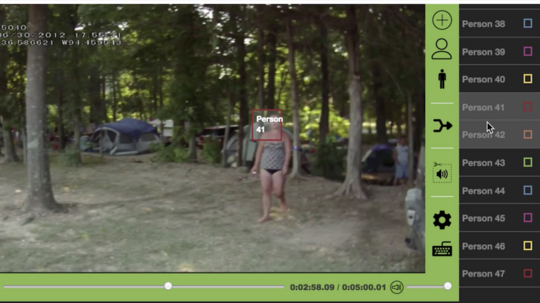
Suspect Technologies sees a big opportunity in the law enforcement and surveillance space with its facial recognition software. But instead of jumping straight into helping law enforcement agencies and other organizations with identifying suspects, the Cambridge-based startup has been focused on a more underserved area: face redaction.
Suspect, which uses a form of artificial intelligence called computer vision, has been relatively quiet so far, having raised a little over $500,000 from investors. But that didn't stop the company from getting the attention of Mark Cuban, the owner of the Dallas Mavericks and one of the stars of ABC's "Shark Tank" pitch show.
Jacob Sniff, Suspect's CEO and co-founder, told BostInno that he got Cuban's attention by sending the investor a cold email — an approach that has actually worked with Cuban before ("I guess I got lucky," Sniff said). Beyond receiving some of that sweet Cuban money, the relationship resulted in the Mavericks testing Suspect's facial recognition tech in the locker room as a way to greet individual players on a screen with customized messages and calendars.
Facial recognition when anyone enters the locker room!
Live Stream: https://t.co/tRkqEEZPlv pic.twitter.com/UqtSAfqMcn
— Dallas Mavericks (@dallasmavs) September 30, 2017
But besides that unique use case, Suspect has been focused on supplying its face redaction technology to companies that make body cameras for law enforcement agencies. Sniff said the company's current clients include PatrolEyes, Wolfcom and Vievu, among others.
Sniff said the demand for Suspect's face redaction technology has been driven by the adoption of body-worn cameras by law enforcement agencies. The move by police departments to equip officers with cameras has largely been in reaction to public pressure following high-profile shootings. But while a recent study cast doubt on whether body cameras can have an impact on use of force or citizen complaints, the videos produced by body cameras in some cases can be released to the public for review.
"I think in a few years everyone will be calling for copies of videos," Sniff said.
https://www.youtube.com/watch?v=Pi669Vw2swo
With the public availability of body camera footage, that means police departments need to redact the faces of victims and other individuals who appear in videos to protect their privacy — which is what Suspect is ultimately helping law enforcement agencies address.
By automating the process of blurring faces, Sniff said Suspect can save law enforcement agencies significant time and money. Whereas the manual act of redacting faces could take well over an hour for a 10-minute video, Sniff said his software can whittle down the process to under 30 minutes, or even 10-20 minutes in some cases.
With the company generating revenue from its redaction technology, Suspect is now planning to raise its next round of funding to expand into the facial recognition space, which will allow law enforcement agencies to use body cameras to look for suspects, both in real-time and in post-processing, by cross-referencing with watchlists. Sniff said Suspect is already piloting the technology with a smart camera manufacturer internationally.
Suspect is also planning to use its facial recognition technology for surveillance cameras, which can be used, for instance, in a police department lobby to quickly identify suspects.
I asked Sniff if he thinks the general public has an appetite for technology that can raise privacy concerns, and he didn't seem too worried.
"People are becoming more accepting of it," Sniff said. "It's used to find a suspect in a public space. I don't see how it's that much different," he added, pointing to existing uses of facial recognition technology, like kiosks that scan faces for real-time ad triggering.
"From a public safety viewpoint, I think law enforcement will be open to it. They're the ones who are going to be the decision-makers," Sniff said.








